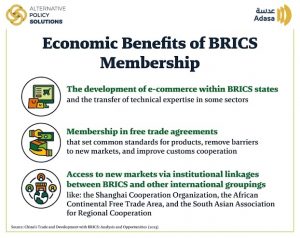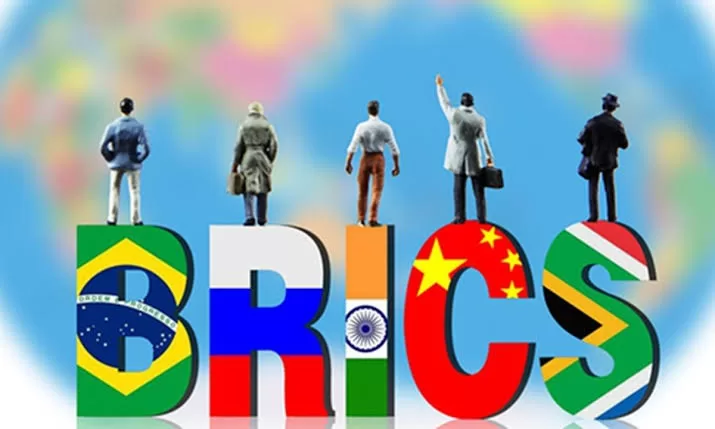CAIRO – Egypt’s membership in the BRICS bloc officially came into effect in a landmark move as of this month, with five other new members, heralding a wave of anticipated benefits for the country.
Economists expressed their positive outlook regarding Egypt’s potential gains from BRICS membership.
“In the short term, the trade partnership between Egypt and the bloc’s countries is expected to be active, focusing on the food security file due to Russia’s significant role as the primary supplier of Egypt’s wheat imports. Additionally, efforts will concentrate on boosting revenues within the tourism sector,” Economist Shaymaa Sherif told local media.
Egypt’s trade exchange with BRICS members, including founding and new members, amounts to $46.673 billion – or more than a third of the country’s total external trade, according to official data for 2022 and 2023.
The BRICS countries are actively seeking to improve the settlement of transactions among themselves in local currencies to reduce dependency on the US dollar, Sherif said.

She predicted the impact of these measures to be seen during the second half of 2024.
In 2023, Egypt signed a memorandum of understanding (MoU) and an agreement for debt swap and settlement of trade in local currencies with the UAE and China, also BRICS members.
Economic researcher Ihab el-Gamal underscored the immediate advantages of Egypt’s BRICS membership, highlighting the potential for increased trade volumes and diversification of export destinations in the short term.
El-Gamal stressed BRICS’ engagement in collaborative infrastructure projects, foreseeing potential short-term benefits for Egypt in vital areas such as transportation, energy, and telecommunications.
He also stressed BRICS nations’ progress in technology and innovation, offering Egypt access to cutting-edge technologies and expertise and fostering rapid development across sectors.
Moreover, Egypt would gain more prominent geopolitical influence as a member of BRICS, which will strengthen its influence in the global stage, el-Gamal told Al-Ahram daily.
Entering BRICS will benefit Egypt in a number of ways, professor of business administration Mohamed Gamal from Benha University said.
“Egypt will get a range of advantages from joining BRICS, with the most noticeable being the arrival of new investment flows,” he told The Egyptian Gazette.
“Besides, Egypt will be able to profit from increasing trade turnover with BRICS countries,” he added as he noted that at least 42 per cent of the planet’s population lives in BRICS, with the grouping accounting for 32 per cent of the global GDP.
According to the expert, BRICS is capable of “putting pressure on Western countries without allowing them to make decisions unilaterally while making them take the interests of member countries into account.” In all, at least 19 countries are seeking to join BRICS, Gamal said. However, “the most effective economies” became members of the association at the initial stage of the expansion, he added.

The organisation itself is “one of the world’s strongest in the sphere of politics and economy.”
The BRICS group, established in 2006, first expanded in 2011, when South Africa joined the four founding nations (Brazil, Russia, India and China). Five new members (Egypt, Iran, the United Arab Emirates, Saudi Arabia and Ethiopia) formally became full-fledged members of the BRICS group on January 1. Russia assumed BRICS’ one-year rotating chairmanship on the same day.
Meanwhile, Finance Minister Mohamed Maeet said that Egypt joining BRICS will help promote investment and export opportunities and foreign direct investment (FDI) flows.
According to a recent statement issued by the Finance Ministry, the minister said that this additional positive step, which reflects the political and economic weight of Egypt, helps support economic co-operation and deepening trade exchange between Egypt and the member states of BRICS.
The diversity of the productive and commodity structure of exports achieves the integration of supply chains and imports among the BRICS countries, Maeet added.
Dealing in national currencies between BRICS member states helps Egypt rationalise the basket of currencies spent to pay the import bill and thus relieve pressure on the State’s budget, which bears heavy burdens to secure the basic needs of wheat and fuel in the wake of the outbreak of war in Europe and the global inflation, all these caused an unprecedented hike in the prices of goods and services, Maeet said.
Through joining the BRICS, Egypt is believed to have been trying to alleviate the dominance of the US dollar in the North African country’s economy amid an unforgiving economic crisis triggered by internal and external factors such as the currency devaluation and the Israeli war on the neighbouring Palestinian Gaza Strip,” financial analyst Ahmed Hamouda told local press.
The addition of the new member countries is likely to reinforce the group’s economic and political impact, representing a combined population of around 2.5 billion and a collective GDP of more than $US 16 trillion.
It remains unpredictable how such expansion in the BRICS membership could shape global economic and political dynamics in the coming years.
“There have been attempts to enforce ‘de-dollarisation’ to reduce the dependency on the US dollar in international commercial deals, especially since Egypt is a country that relies on import rather than local production,” Hamouda said.
Egypt had earlier opened the door to dollar-free trade transactions through bilateral agreements with Russia, China, and India, a step that may help promote the inclusion of the Egyptian local currency in international financial transactions with BRICS countries, which are also seeking to end the control of the US dollar on the global economy.
Earlier last year, the Russian central bank added the Egyptian pound to the Russian exchange rate.
As a member of the BRICS bloc, Egypt can seek support from other member states of the bloc to secure US dollars in order to meet shortages in its foreign currency reserves.
“Under the Contingent Reserve Arrangement (CRA) in the BRICS bloc, any member state of the bloc can ask to buy US dollars using their local currency from other member states in the bloc to meet any emergency shortages in dollar reserves in their country,” financial markets expert Ahmed Moati said.
Egypt, like other member states in the BRICS bloc, can also seek aid from other member states in the bloc to reduce its own budget deficits, Moatit old local media.
“BRICS comprises an agreement through which a member state can ask other members of the bloc for financial aid to help lower its budget deficit,” he noted.
Last May, Egypt revised its budget deficit estimate to 6.9 per cent of GDP in FY2023/2024, up from an earlier estimate of 6.3 per cent.
The government attributed the revised figure to hikes in interest rate domestically amid similar hikes in markets globally, increased spending on social protection programmes, and the rising cost of basic commodities such as food and fuel.
BRICS: Big players
The five founding member states of BRICS, Brazil, Russia, India, China, and South Africa, collectively account for 41 percent of the world’s population.
These BRICS founding members account for a quarter of the global economy and 16 per cent of global trade, according to World Bank figures.
The Egyptian Cabinet’s Information and Decision Support Center (IDSC) stressed that joining BRICS will enable Egypt to benefit from constructive co-operation among member states in the bloc in supporting domestic sustainable development efforts.
The IDSC also stressed that the bloc’s objective to reduce reliance on the US dollar in international transactions is beneficial for Egypt, which seeks to alleviate pressures on its own foreign exchange reserves.
Remittances from Egyptian expatriates, a significant source of foreign currency for the country, also declined by 26.1 per cent, from $23.6 billion in the first three quarters of FY2021-2022 to $17.5 billion in the same period in FY2022-2023.
In 1944, towards the end of WWII, the United States and its allies established the foundation for a rules-based international financial system in the Bretton Woods Agreement, which was signed at a major conference in New Hampshire, US.
The Bretton Woods agreement paved the way for remarkable economic growth in the subsequent decades after the war.
However, amid ongoing economic crises triggered by the coronavirus pandemic and the Russian-Ukrainian war, various officials worldwide have been calling for “a new Bretton Woods” agreement to solve new problems in the world economic system.
Egypt’s accession, along with the African and developing countries, to the BRICS group, with China in particular, will provide a set of facilities, most notably: grants and soft loans with reduced interest, in addition to benefiting from the economic expertise of the participating countries and investment financing.
The joining of many African and developing countries into various alliances will enable them to diversify their sources of income and borrowing, and it would be better for them to open up to others.






Discussion about this post